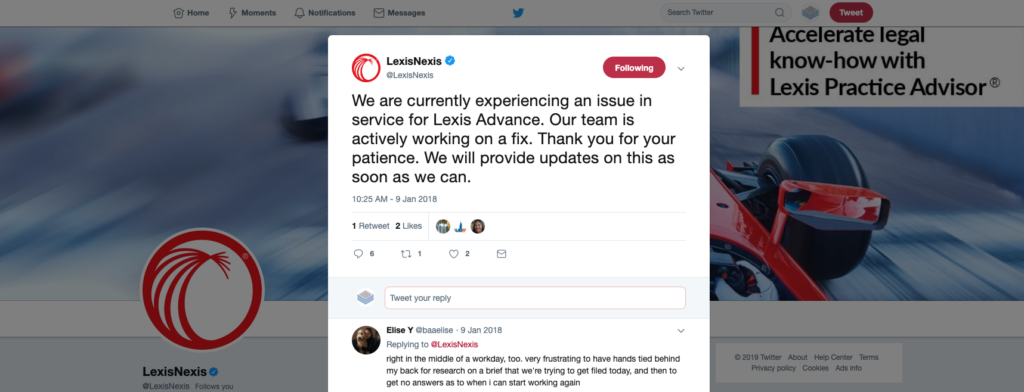
LexisNexis recently published a “whitepaper” discussing Casetext.1 It argues that Casetext, while more affordable, is risky to use for legal research, purporting to cite specific shortcomings of Casetext as proof.
There’s only one problem: the paper is full of blatant lies. Not strategic repositioning of the truth. Not arguable statements of quality. Lies.2
Why would LexisNexis make false claims, especially those that are so easily refuted? Because their product cannot stand up to Casetext in a head-to-head competition. They know that they have one dwindling advantage. It’s not their product or reliability. It’s entrenchment.
In other words, they are scared. And in truth, they probably should be.
For years, they have been selling a bad product at a high price to attorneys who didn’t feel like they had many other options. They benefited from a duopoly. But instead of using their position of power to understand the pain-points of litigators, invest in innovation, and improve their product, they expanded their revenue at the cost of the consumer. And this short-sighted strategy is showing its cracks. In the last 9 months alone, 3,500 law firms adopted Casetext, most of whom switched from Lexis.3

According to the Lexis whitepaper, trying new legal research technologies is “risky.” But customers know that taking advantage of the industry’s best technology isn’t risky. Failing to do so is risky. Competition is fierce among lawyers, in the courtroom and out of it. They don’t want to risk:
In short, LexisNexis is scared because legal research that uses better technology to achieve better results at a lower cost threatens their existence. So they paint the competition as risky, hoping that customers won’t look further.
What is risky for a legal research company like Lexis? Failing to invest time and money to improve a product for so long that the only recourse left is writing inaccurate whitepapers about your competitors.
1 http://www.lexisnexis.com/em/docs/Cost%20of%20Free%20Whitepaper.pdf
2 A few examples: (1) They say Casetext’s citator, SmartCite (our alternative to Shepard’s), is “based on algorithms rather than human editors.” While we do use algorithms to make the process more efficient, a team of human editors reviews SmartCite results. By using both, we actually improve accuracy, allowing computers to catch human error and visa versa. (2) They say Casetext doesn’t have slip opinions. Slip opinions are available on Casetext within 24 hours of publication. (3) They say Casetext doesn’t have case summaries. Not only does Casetext have over four million case summaries — those summaries are penned by judges, rather than nameless editors.
3 A study conducted by the National Legal Research Group found that 75% of attorneys preferred Casetext to LexisNexis, they found 21% more on-point cases, and did so 25% faster.
4 https://www.lexisnexis.com/en-us/SmallLaweCommerce
5 Hopefully, it wasn’t a Sustainability and Risk Report.
6 https://www.lexisnexis.com/en-us/SmallLaweCommerce
Rapidly draft common legal letters and emails.
How this skill works
Specify the recipient, topic, and tone of the correspondence you want.
CoCounsel will produce a draft.
Chat back and forth with CoCounsel to edit the draft.
Get answers to your research questions, with explanations and supporting sources.
How this skill works
Enter a question or issue, along with relevant facts such as jurisdiction, area of law, etc.
CoCounsel will retrieve relevant legal resources and provide an answer with explanation and supporting sources.
Behind the scenes, Conduct Research generates multiple queries using keyword search, terms and connectors, boolean, and Parallel Search to identify the on-point case law, statutes, and regulations, reads and analyzes the search results, and outputs a summary of its findings (i.e. an answer to the question), along with the supporting sources and applicable excerpts.
Get answers to your research questions, with explanations and supporting sources.
How this skill works
Enter a question or issue, along with relevant facts such as jurisdiction, area of law, etc.
CoCounsel will retrieve relevant legal resources and provide an answer with explanation and supporting sources.
Behind the scenes, Conduct Research generates multiple queries using keyword search, terms and connectors, boolean, and Parallel Search to identify the on-point case law, statutes, and regulations, reads and analyzes the search results, and outputs a summary of its findings (i.e. an answer to the question), along with the supporting sources and applicable excerpts.
Get a thorough deposition outline in no time, just by describing the deponent and what’s at issue.
How this skill works
Describe the deponent and what’s at issue in the case, and CoCounsel identifies multiple highly relevant topics to address in the deposition and drafts questions for each topic.
Refine topics by including specific areas of interest and get a thorough deposition outline.
Ask questions of contracts that are analyzed in a line-by-line review
How this skill works
Allows the user to upload a set of contracts and a set of questions
This skill will provide an answer to those questions for each contract, or, if the question is not relevant to the contract, provide that information as well
Upload up to 10 contracts at once
Ask up to 10 questions of each contract
Relevant results will hyperlink to identified passages in the corresponding contract
Get a list of all parts of a set of contracts that don’t comply with a set of policies.
How this skill works
Upload a set of contracts and then describe a policy or set of policies that the contracts should comply with, e.g. "contracts must contain a right to injunctive relief, not merely the right to seek injunctive relief."
CoCounsel will review your contracts and identify any contractual clauses relevant to the policy or policies you specified.
If there is any conflict between a contractual clause and a policy you described, CoCounsel will recommend a revised clause that complies with the relevant policy. It will also identify the risks presented by a clause that does not conform to the policy you described.
Get an overview of any document in straightforward, everyday language.
How this skill works
Upload a document–e.g. a legal memorandum, judicial opinion, or contract.
CoCounsel will summarize the document using everyday terminology.
Find all instances of relevant information in a database of documents.
How this skill works
Select a database and describe what you're looking for in detail, such as templates and precedents to use as a starting point for drafting documents, or specific clauses and provisions you'd like to include in new documents you're working on.
CoCounsel identifies and delivers every instance of what you're searching for, citing sources in the database for each instance.
Behind the scenes, CoCounsel generates multiple queries using keyword search, terms and connectors, boolean, and Parallel Search to identifiy the on-point passages from every document in the database, reads and analyzes the search results, and outputs a summary of its findings (i.e. an answer to the question), citing applicable excerpts in specific documents.
Get a list of all parts of a set of contracts that don’t comply with a set of policies.
Ask questions of contracts that are analyzed in a line-by-line review
Get a thorough deposition outline by describing the deponent and what’s at issue.
Get answers to your research questions, with explanations and supporting sources.